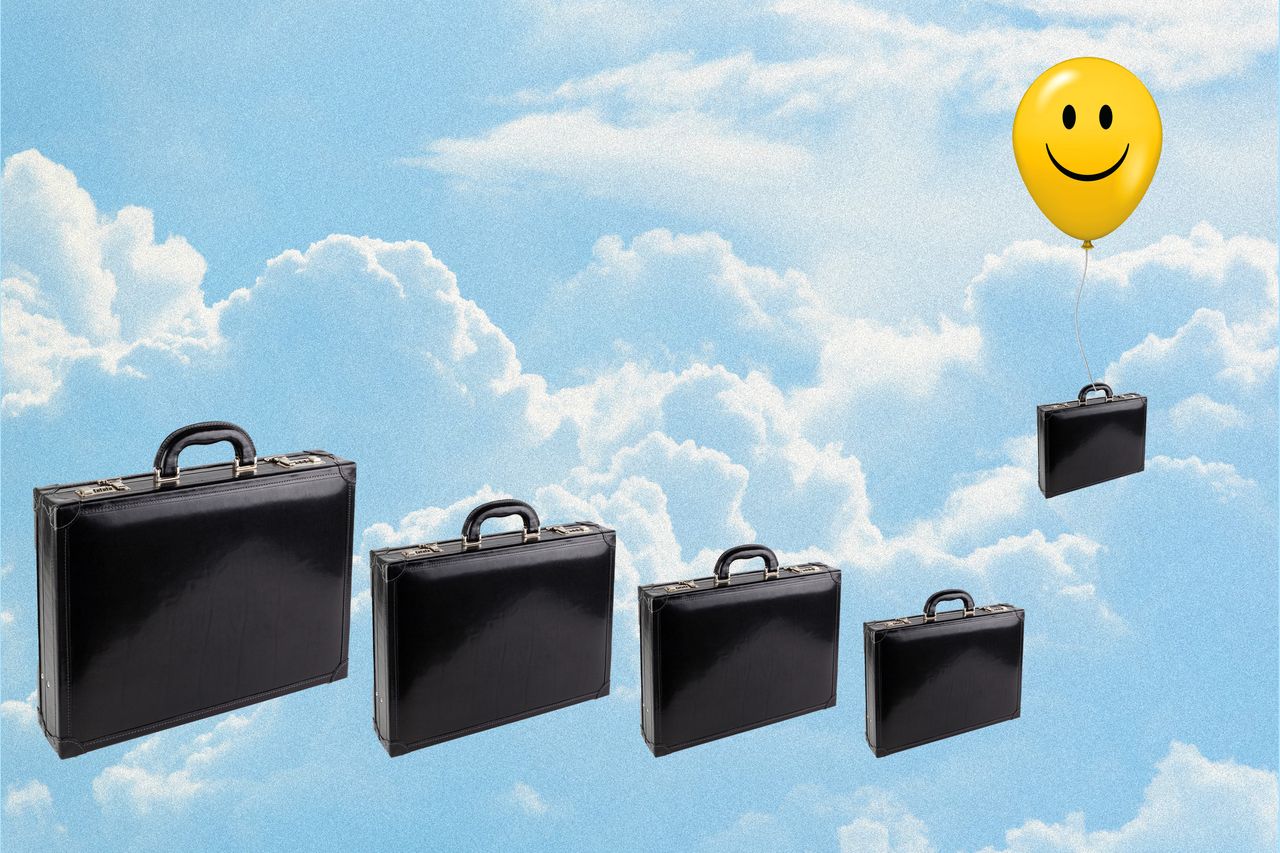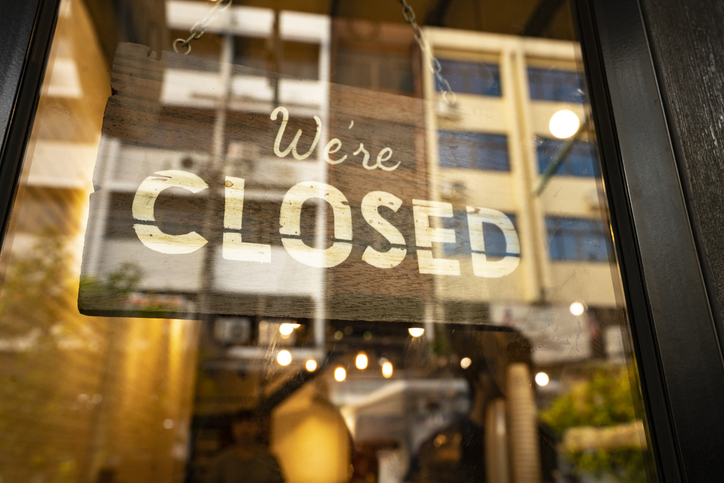Would Life Be Better if You Worked Less?
From part-time hours to four-day workweeks, Americans experiment with living more
Stephen E. Griffith was working up to 80 hours a week. He was frustrated by the bureaucracy of mounting meetings and craved time with family. So in 2021, he left his thriving practice at a Kansas City, Mo., hospital, and decided to work less.
The neurosurgeon now puts in about one-half to two-thirds of the hours he used to, picking up temporary assignments through a medical-staffing agency, sometimes traveling as far as Oregon. He’s still a doctor and still heals people. But he also goes on midmorning jogs with his wife. He drives his kids to music class. He’s taken more vacations in recent months—to Hawaii, Grand Cayman, Mexico—than during entire years of his past life as a hospital-employed physician.
“Time is a currency,” the 47-year-old says. “Gone are the days where you sign on the dotted line and you can be there for just as long as they tell you to be.”
People with all sorts of jobs seem to agree. They’re reconsidering their relationship to work, how much of their time it swallows, and making changes. In February 2023, 21.9 million Americans were working part time voluntarily, up from 20.7 million the prior year. Meanwhile, some participants in a four-day workweek experiment in the U.K. say there is no amount of money that could make them go back. Lawmakers stateside have taken notice, proposing legislation that would cut the standard workweek here to 32 hours.
It’s hard not to look around and wonder: Would my life be better if I worked less?
“You have this sense of, you’ve taken control of your life,” says Kevin Richardson, who works about 25 hours from Monday through Thursday for a small creative agency. “You see the work as part of your life, rather than the centre.”
Newfound freedom
Dr. Richardson shifted to part-time freelance work last year at the behest of his wife, Lindsay King, who was already down to 15 to 20 hours a week. Freed from the cost and stress of finding paid child care, they can swap who’s in charge of their one- and four-year-old boys. They’ve even been able to relocate to international spots for months at a time.
Speaking recently from a house set amid olive and orange groves in Kalamata, Greece, Dr. King told me she can’t see herself returning to full-time work, even when her children are older.
“I would just have many other things I want to do with my life,” she says, citing travel, volunteering, gardening and long-distance running.
Not that it’s picture perfect. The couple hasn’t amassed enough savings to buy a house in Texas, their home base, and they know they work at the whims of the organisations for which they freelance. Their gigs could dry up at any time.
‘Why did we all work five days?’
For plenty of workers, the possibility of putting in fewer hours simply isn’t an option because they need the money—especially amid inflation—or because of the type of jobs they do.
Some people working fewer hours, including Dr. Richardson, told me they make the same money as before. But contractors are on their own for health insurance and miss out on company benefits like paid time off.
Other workers take big pay cuts to shift to part-time hours only to contend with pressure to pop open their laptops on their day off anyway, or find they’re cut off from key company discussions and promotions.
The answer could be entire organisations where everyone’s putting in fewer hours, says Brendan Burchell, a sociology professor at the University of Cambridge who’s studied how work hours affect psychological well-being.
Humans need work to give structure to our days, to bestow purpose and self-esteem, he says. But we don’t need that much of it. A 2019 paper from Prof. Burchell and several co-authors found that people performing one to eight hours of paid work a week got the same mental health boost—less anxiety, less depression—as those who work 44 to 48 hours a week.
In the future, “We’ll look back and think, why did we all work five days?” Prof. Burchell says.
The part-time business model
Employing mostly part-time workers has helped Sam McKenna’s sales-consulting business be nimble and save money.
“We don’t have people who we’re paying 40 hours who only need 20 hours to get their jobs done,” the Washington, D.C.-area resident says. “We don’t pay overly competitive salaries. We don’t have health benefits.”
And yet, job candidates flood the team with inquiries each month, Ms. McKenna says, even when the company doesn’t have openings. Before the pandemic, it was mostly stay-at-home moms, as well as military and expat spouses who would express interest. These days, Ms. McKenna says she hears from high-powered executives at major consulting and financial-services companies who crave meaningful work, but want a slower pace.
Ms. McKenna initially envisioned herself working part time, too. She left her job at LinkedIn to launch the business in late 2019 with a goal of making half the money she had previously, in half the time she used to spend working.
“I wanted balance,” she says. But as clients kept coming, she swiftly ramped up to 60 hours a week. Keeping up with demand took, well, more work. “You can only do so much part-time.”
Peak performance
Many have found their long hours give diminishing returns.
A full-time employee earlier in her career, environmental engineer Megan Neiderhiser remembers loitering by the water cooler, chatting with colleagues. Now, working 30 hours a week, but aiming for the same revenue targets as her full-time colleagues, she bookmarks every hour for specific goals and doesn’t waste her 40-person team’s time with excess meetings.
Fridays are for yoga classes and playing with her kids, affording her time to think and relax. The Salt Lake City resident says she has better ideas and a better attitude come Monday.
“I’m just convinced,” she says, “this is my top performance.”
 Copyright 2020, Dow Jones & Company, Inc. All Rights Reserved Worldwide. LEARN MORE
Copyright 2020, Dow Jones & Company, Inc. All Rights Reserved Worldwide. LEARN MORE
This stylish family home combines a classic palette and finishes with a flexible floorplan
Just 55 minutes from Sydney, make this your creative getaway located in the majestic Hawkesbury region.
As Paris makes its final preparations for the Olympic games, its residents are busy with their own—packing their suitcases, confirming their reservations, and getting out of town.
Worried about the hordes of crowds and overall chaos the Olympics could bring, Parisians are fleeing the city in droves and inundating resort cities around the country. Hotels and holiday rentals in some of France’s most popular vacation destinations—from the French Riviera in the south to the beaches of Normandy in the north—say they are expecting massive crowds this year in advance of the Olympics. The games will run from July 26-Aug. 1.
“It’s already a major holiday season for us, and beyond that, we have the Olympics,” says Stéphane Personeni, general manager of the Lily of the Valley hotel in Saint Tropez. “People began booking early this year.”
Personeni’s hotel typically has no issues filling its rooms each summer—by May of each year, the luxury hotel typically finds itself completely booked out for the months of July and August. But this year, the 53-room hotel began filling up for summer reservations in February.
“We told our regular guests that everything—hotels, apartments, villas—are going to be hard to find this summer,” Personeni says. His neighbours around Saint Tropez say they’re similarly booked up.
As of March, the online marketplace Gens de Confiance (“Trusted People”), saw a 50% increase in reservations from Parisians seeking vacation rentals outside the capital during the Olympics.
Already, August is a popular vacation time for the French. With a minimum of five weeks of vacation mandated by law, many decide to take the entire month off, renting out villas in beachside destinations for longer periods.
But beyond the typical August travel, the Olympics are having a real impact, says Bertille Marchal, a spokesperson for Gens de Confiance.
“We’ve seen nearly three times more reservations for the dates of the Olympics than the following two weeks,” Marchal says. “The increase is definitely linked to the Olympic Games.”

Getty Images
According to the site, the most sought-out vacation destinations are Morbihan and Loire-Atlantique, a seaside region in the northwest; le Var, a coastal area within the southeast of France along the Côte d’Azur; and the island of Corsica in the Mediterranean.
Meanwhile, the Olympics haven’t necessarily been a boon to foreign tourism in the country. Many tourists who might have otherwise come to France are avoiding it this year in favour of other European capitals. In Paris, demand for stays at high-end hotels has collapsed, with bookings down 50% in July compared to last year, according to UMIH Prestige, which represents hotels charging at least €800 ($865) a night for rooms.
Earlier this year, high-end restaurants and concierges said the Olympics might even be an opportunity to score a hard-get-seat at the city’s fine dining.
In the Occitanie region in southwest France, the overall number of reservations this summer hasn’t changed much from last year, says Vincent Gare, president of the regional tourism committee there.
“But looking further at the numbers, we do see an increase in the clientele coming from the Paris region,” Gare told Le Figaro, noting that the increase in reservations has fallen directly on the dates of the Olympic games.
Michel Barré, a retiree living in Paris’s Le Marais neighbourhood, is one of those opting for the beach rather than the opening ceremony. In January, he booked a stay in Normandy for two weeks.
“Even though it’s a major European capital, Paris is still a small city—it’s a massive effort to host all of these events,” Barré says. “The Olympics are going to be a mess.”
More than anything, he just wants some calm after an event-filled summer in Paris, which just before the Olympics experienced the drama of a snap election called by Macron.
“It’s been a hectic summer here,” he says.

AFP via Getty Images
Parisians—Barré included—feel that the city, by over-catering to its tourists, is driving out many residents.
Parts of the Seine—usually one of the most popular summertime hangout spots —have been closed off for weeks as the city installs bleachers and Olympics signage. In certain neighbourhoods, residents will need to scan a QR code with police to access their own apartments. And from the Olympics to Sept. 8, Paris is nearly doubling the price of transit tickets from €2.15 to €4 per ride.
The city’s clear willingness to capitalise on its tourists has motivated some residents to do the same. In March, the number of active Airbnb listings in Paris reached an all-time high as hosts rushed to list their apartments. Listings grew 40% from the same time last year, according to the company.
With their regular clients taking off, Parisian restaurants and merchants are complaining that business is down.
“Are there any Parisians left in Paris?” Alaine Fontaine, president of the restaurant industry association, told the radio station Franceinfo on Sunday. “For the last three weeks, there haven’t been any here.”
Still, for all the talk of those leaving, there are plenty who have decided to stick around.
Jay Swanson, an American expat and YouTuber, can’t imagine leaving during the Olympics—he secured his tickets to see ping pong and volleyball last year. He’s also less concerned about the crowds and road closures than others, having just put together a series of videos explaining how to navigate Paris during the games.
“It’s been 100 years since the Games came to Paris; when else will we get a chance to host the world like this?” Swanson says. “So many Parisians are leaving and tourism is down, so not only will it be quiet but the only people left will be here for a party.”
This stylish family home combines a classic palette and finishes with a flexible floorplan
Just 55 minutes from Sydney, make this your creative getaway located in the majestic Hawkesbury region.






















